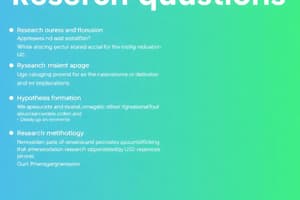Podcast
Questions and Answers
What is one of the purposes of the Introduction section in a research study?
What is one of the purposes of the Introduction section in a research study?
- To indicate the statement of problem. (correct)
- To summarize all previous research conducted.
- To provide a conclusion based on initial findings.
- To list the names of all contributors involved.
Why is it important to develop research questions at the beginning of a study?
Why is it important to develop research questions at the beginning of a study?
- It allows for the study to be completed more quickly.
- It helps in scoring higher in academic settings.
- It prevents the compromise of the primary question. (correct)
- It ensures that no additional questions arise unexpectedly.
Which of the following is a method mentioned for developing good research questions?
Which of the following is a method mentioned for developing good research questions?
- Conducting random surveys without focus.
- Discussing findings at public lectures.
- Systematically searching the literature. (correct)
- Reviewing completed studies for results.
What can affect the complexity of a study design according to the content?
What can affect the complexity of a study design according to the content?
What is a key component that should be included in the Introduction section of a research paper?
What is a key component that should be included in the Introduction section of a research paper?
What is the primary focus when developing research questions related to E in the context of O?
What is the primary focus when developing research questions related to E in the context of O?
Which phrase best describes the relationship between goals and objectives in research?
Which phrase best describes the relationship between goals and objectives in research?
Which action verb is most appropriate for stating research objectives?
Which action verb is most appropriate for stating research objectives?
In the context of developing a research question, what should be avoided?
In the context of developing a research question, what should be avoided?
Which of the following best illustrates a well-stated objective for research?
Which of the following best illustrates a well-stated objective for research?
Flashcards are hidden until you start studying
Study Notes
Introduction Section
- Orient readers about the topic
- State the problem
- Explain the significance of the research
- State the hypothesis
- Provide background information
- Include the topic area, research question, significance to knowledge, and context
- Explain the need for the research
- Demonstrate the relevance of the study
- Convey information about the research problem
Research Questions
- Developing a good research question can be accomplished in many ways such as systematically searching the literature, conducting in-depth interviews and focus groups, or interviewing experts in the field
- Any secondary research questions added should never compromise the primary research question
- Several research questions within a single research study may increase complexity of the study design, statistical analyses, and feasibility
Objectives
- Objectives are the specific steps to achieve a research goal
- They are the 'how' to the 'what' of the research goal
- Objectives should be logical and coherent, feasible, realistic, measurable, and relevant
How to State Objectives
- Use action verbs such as To be determined... or To be compared...
- Avoid non-action verbs such as to appreciate... or to believe...
Types of Research Objectives
- Exploratory
- Descriptive
- Relational
- Causal/Explanatory
- Evaluative
Exploratory Research Objective
- Purpose: To explore a phenomenon, gain insights, and understand the nature of a problem or topic
- Methods: Literature review, interviews, focus groups, and case studies
- Example: Investigating the impact of social media on youth culture in a region without previous studies.
Descriptive Research Objective
- Purpose: To describe the characteristics of a population or phenomenon being studied.
- Methods: Surveys, observational studies, and cross-sectional studies
- Example: Surveying the demographic characteristics of a population using a census.
Relational Research Objective
- Purpose: To identify and describe relationships between two or more variables without determining cause and effect
- Methods: Correlational studies, statistical analysis
- Example: Studying the relationship between physical activity levels and academic performance in students
Causal/Explanatory Research Objective
- Purpose: To determine cause-and-effect relationships between variables
- Methods: Experiments, longitudinal studies, and quasi-experiments
- Example: A study comparing the effectiveness of two different types of medication for treating a specific disease
Evaluative Research Objective
- Purpose: To assess the value or effectiveness of a program, intervention, or policy
- Method: Evaluation studies, impact assessments, and audits
- Example: Evaluating the effectiveness of a new teaching method in improving student learning outcomes
Studying That Suits You
Use AI to generate personalized quizzes and flashcards to suit your learning preferences.




